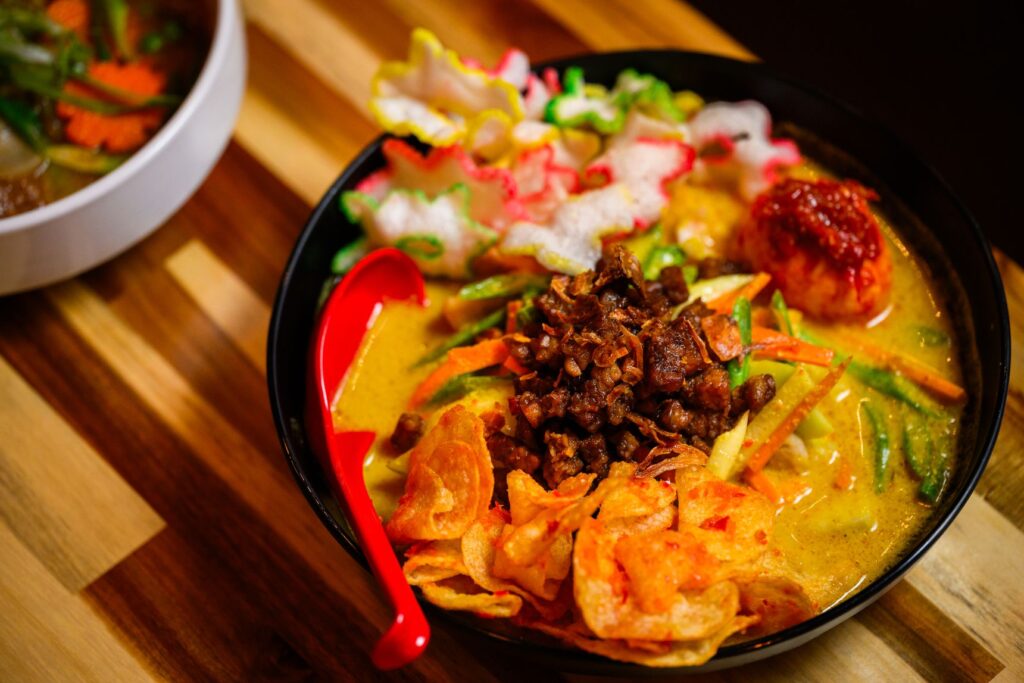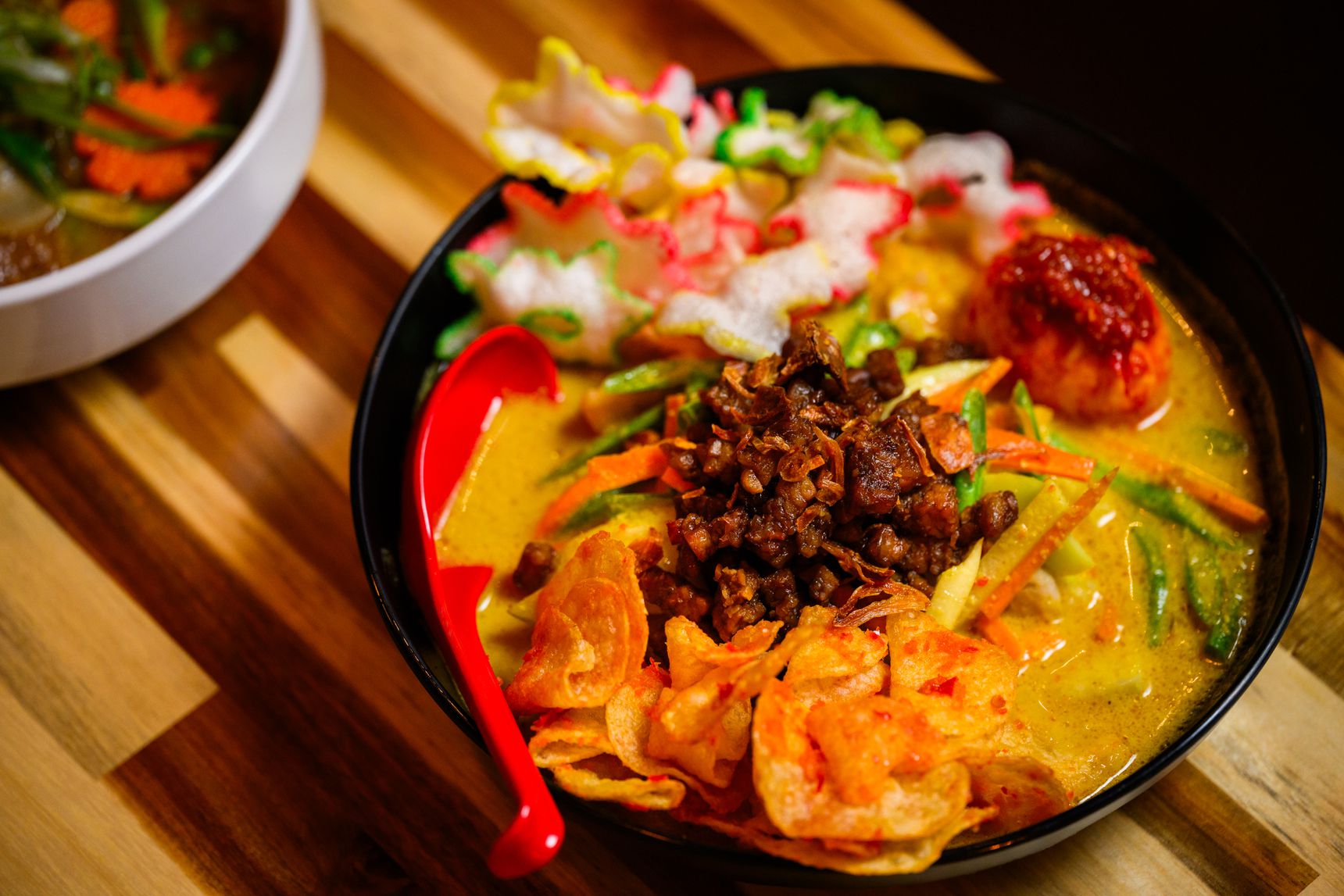
Discover Authentic Indonesian Food in Portland: A Culinary Journey
Portland, Oregon, a city celebrated for its diverse and innovative culinary scene, offers a surprising and delightful array of Indonesian restaurants and dishes. If you’re craving the rich flavors, exotic spices, and comforting warmth of authentic Indonesian cuisine, you’ve come to the right place. This comprehensive guide will take you on a culinary journey through Portland’s best Indonesian food experiences, ensuring you discover hidden gems and savor the true taste of Indonesia right here in the Pacific Northwest. We’ll explore everything from traditional rendang and gado-gado to modern interpretations of classic dishes, providing insights and recommendations to satisfy every palate. Get ready to explore the vibrant world of Indonesian food in Portland.
A Taste of Indonesia in the Rose City
Indonesian cuisine is a tapestry of flavors, reflecting the archipelago’s diverse cultures, geography, and history. From the fiery spices of Sumatra to the subtle sweetness of Javanese dishes, Indonesian food offers a unique and unforgettable culinary experience. Portland’s Indonesian food scene, while not as extensive as other major cities, boasts several excellent restaurants and food carts that are passionate about sharing the authentic tastes of their homeland.
This guide aims to be your trusted resource for finding the best Indonesian food in Portland. We’ve scoured the city, sampled countless dishes, and spoken with local chefs to bring you the most accurate and up-to-date information. Whether you’re a seasoned Indonesian food enthusiast or a curious newcomer, we’ll help you navigate the menus, understand the ingredients, and appreciate the artistry behind each dish.
Navigating the World of Indonesian Flavors
Before diving into specific restaurants, it’s helpful to understand some of the key ingredients and dishes that define Indonesian cuisine. Many dishes feature a complex blend of spices, including turmeric, ginger, galangal, lemongrass, and chilies. Coconut milk is another staple, adding richness and creaminess to many curries and stews. Rice is the cornerstone of most meals, often served with a variety of side dishes.
Some popular Indonesian dishes you’re likely to encounter in Portland include:
- Rendang: A rich and flavorful beef stew, slow-cooked in coconut milk and a blend of aromatic spices.
- Gado-Gado: A traditional Indonesian salad with steamed vegetables, tofu, tempeh, and a peanut sauce dressing.
- Nasi Goreng: Indonesian fried rice, often served with egg, chicken, or shrimp.
- Sate (Satay): Grilled skewers of marinated meat, served with peanut sauce.
- Mie Goreng: Indonesian fried noodles, similar to nasi goreng but with noodles instead of rice.
- Soto Ayam: A flavorful chicken soup with noodles, vegetables, and a hard-boiled egg.
- Sambal: A chili-based sauce or paste, used to add heat and flavor to dishes.
Understanding these basic dishes will help you navigate menus and appreciate the diversity of Indonesian cuisine available in Portland.
Top Indonesian Restaurants and Food Carts in Portland
Now, let’s explore some of the best places to find authentic Indonesian food in Portland. These establishments have been carefully selected based on their commitment to quality ingredients, authentic flavors, and excellent customer service.
Wajan: A Portland Indonesian Food Staple
Wajan stands out as a highly regarded Indonesian restaurant in Portland. They are known for their authentic recipes and warm, inviting atmosphere. Their rendang is a particular highlight, praised for its rich, complex flavor and tender beef. They also offer a variety of other classic Indonesian dishes, including gado-gado, nasi goreng, and sate. Wajan is a great choice for both experienced Indonesian food lovers and newcomers looking to explore the cuisine.
Gado Gado: A Modern Twist on Indonesian Classics
Gado Gado offers a modern and creative take on Indonesian cuisine. While they serve traditional dishes like gado-gado (of course!), they also experiment with new flavors and techniques, resulting in innovative and exciting dishes. The restaurant features a vibrant atmosphere and a menu that changes seasonally, showcasing the best local ingredients. Gado Gado is a great option for those seeking a more adventurous Indonesian dining experience.
Borneo Strategic: Indonesian Flavors on the Go
Borneo Strategic is a popular food cart serving authentic Indonesian dishes. They are known for their generous portions, affordable prices, and flavorful food. Their menu features a variety of classic Indonesian dishes, including nasi goreng, mie goreng, and sate. Borneo Strategic is a great option for a quick and delicious Indonesian meal on the go.
Mama Chow’s Kitchen: A Hidden Gem
Mama Chow’s Kitchen is a hidden gem serving home-style Indonesian cooking. This small, family-run restaurant offers a cozy and welcoming atmosphere. Their menu features a variety of traditional Indonesian dishes, made with fresh, high-quality ingredients. Mama Chow’s Kitchen is a great option for those seeking an authentic and comforting Indonesian meal.
The Art of Making Authentic Rendang
Rendang, often hailed as the king of Indonesian curries, is a dish that exemplifies the complexity and depth of Indonesian flavors. Making authentic rendang is a labor of love, requiring patience, skill, and a deep understanding of spices. The process begins with selecting high-quality beef, typically chuck or brisket, which is then cut into bite-sized pieces.
The spice paste, or *bumbu*, is the heart of rendang. It typically includes a blend of shallots, garlic, ginger, galangal, turmeric, lemongrass, chilies, and other aromatic spices. The spices are ground into a fine paste and then sautéed in coconut oil until fragrant. The beef is then added to the spice paste, along with coconut milk and other ingredients, such as kaffir lime leaves, salam leaves (Indonesian bay leaves), and sometimes grated coconut.
The mixture is then simmered over low heat for several hours, or even overnight, until the beef is incredibly tender and the coconut milk has reduced and caramelized, creating a rich, dark sauce. The slow cooking process is crucial for developing the complex flavors that characterize rendang. The beef absorbs the spices, and the coconut milk transforms into a creamy, intensely flavorful sauce.
Authentic rendang should be rich, flavorful, and slightly spicy. The beef should be incredibly tender, almost melting in your mouth. The sauce should be thick and dark, with a complex blend of sweet, savory, and spicy notes. While rendang can be found in many Indonesian restaurants, finding a truly authentic version requires seeking out establishments that are committed to using traditional methods and high-quality ingredients.
Exploring the Health Benefits of Indonesian Spices
Beyond their delicious flavors, Indonesian spices offer a range of health benefits. Many of the spices commonly used in Indonesian cuisine, such as turmeric, ginger, and galangal, have anti-inflammatory and antioxidant properties. Turmeric, in particular, contains curcumin, a powerful compound that has been shown to have numerous health benefits, including reducing inflammation, improving brain function, and protecting against chronic diseases.
Ginger is another spice with a long history of medicinal use. It has been shown to help relieve nausea, reduce muscle pain, and improve digestion. Galangal, a close relative of ginger, also has anti-inflammatory and antioxidant properties. Chilies, a staple in many Indonesian dishes, contain capsaicin, a compound that has been shown to boost metabolism and reduce pain.
By incorporating these spices into your diet, you can enjoy the delicious flavors of Indonesian cuisine while also benefiting from their health-promoting properties. However, it’s important to note that spices should be consumed in moderation as part of a balanced diet.
Understanding the Cultural Significance of Indonesian Food
Indonesian food is more than just sustenance; it’s an integral part of Indonesian culture and identity. Food plays a central role in celebrations, ceremonies, and everyday life. Many Indonesian dishes have symbolic meanings and are associated with specific traditions.
For example, *tumpeng*, a cone-shaped rice dish, is often served during celebrations and symbolizes gratitude and prosperity. *Nasi kuning*, yellow rice, is often served during birthdays and other special occasions, symbolizing good fortune. *Ketupat*, rice cakes wrapped in woven palm leaves, are traditionally served during Eid al-Fitr, the Muslim holiday marking the end of Ramadan.
Sharing food is also an important aspect of Indonesian culture. Meals are often shared family-style, with everyone taking food from a communal plate. This practice promotes togetherness and strengthens social bonds. By understanding the cultural significance of Indonesian food, you can gain a deeper appreciation for the cuisine and the people who create it.
The Future of Indonesian Food in Portland
The Indonesian food scene in Portland is constantly evolving. As more people discover the delicious flavors and health benefits of Indonesian cuisine, the demand for authentic Indonesian restaurants and food carts is likely to grow. We can expect to see more innovative chefs experimenting with new flavors and techniques, while still honoring the traditions of Indonesian cooking. The future of Indonesian food in Portland looks bright, with exciting new culinary experiences on the horizon.
A Culinary Adventure Awaits
Portland’s Indonesian food scene offers a unique and rewarding culinary adventure. From the rich and complex flavors of rendang to the refreshing and vibrant taste of gado-gado, there’s something for everyone to enjoy. By exploring the restaurants and food carts highlighted in this guide, you can embark on a journey through the diverse and delicious world of Indonesian cuisine. So, gather your friends and family, and get ready to savor the authentic tastes of Indonesia right here in Portland. Share your favorite Indonesian food experiences in the comments below!

